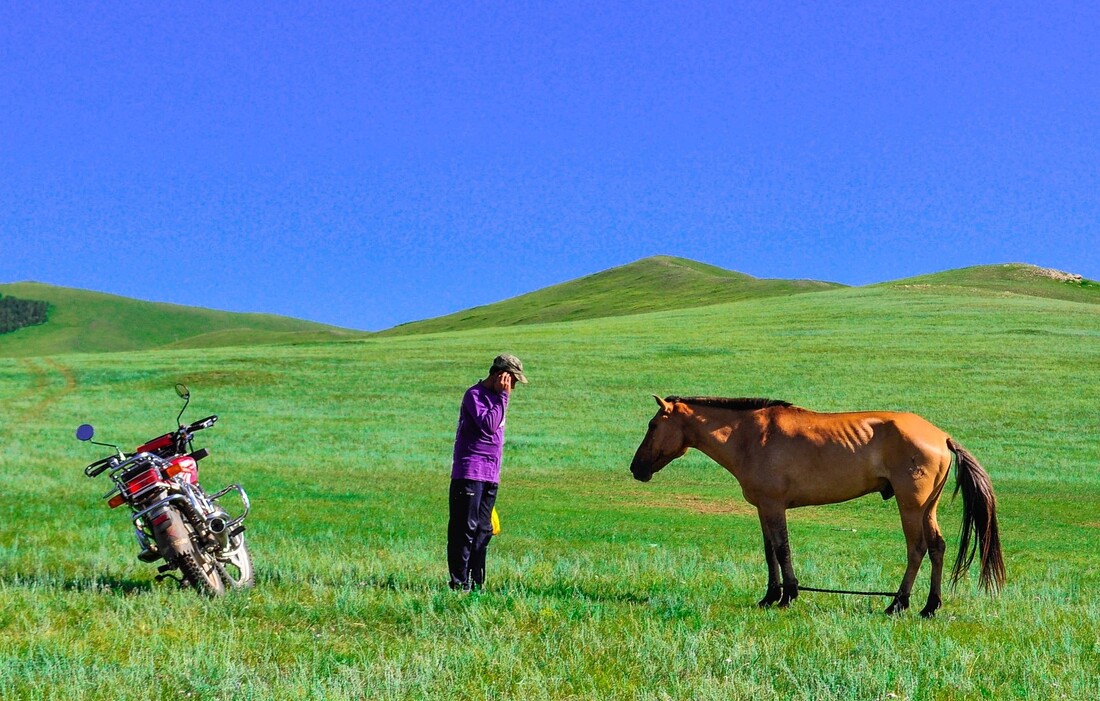|
‘I’m not in your situation. And neither am I you in your situation.’ (David Cooper) A stretching skill in coaching, action learning and facilitation is often to step back and to stay back. I may imagine vividly what I might think, how I might feel and what I might do if I were in the situation a client has described. Nevertheless, as David Cooper has summarised so well (above), the truth is I’m not there and I’m not you. A risk is that I may inadvertently and subconsciously project myself onto the world of the client. Why is this important and how can we use it? Firstly, the client portrays a challenge, dilemma or opportunity from their own perspective. It’s a personally and-or socially-constructed view with associated feelings that may reveal all kinds of hidden assumptions, beliefs, values, hopes and expectations. These may be quite different to what the same situation could hold for the coach. Exploring how the client construes the situation and what lays behind and beneath it for them can unlock fresh insight and potential. Secondly, factors that stand out to the client as significant in a situation can be very different to those that stand out for the coach because of differences in what people notice, what value they attach to it and what meaning they make of it. What a person notices is influenced psychologically by what’s important to them. What, therefore, surfaces into awareness (or not) for the client can shed useful light on underlying personal-cultural assumptions, beliefs and values. Thirdly, how the coach could act in the client’s situation - and the consequences of their actions - would be influenced by their own lived experiences, their personal preferences and cultural norms, their own networks of relationships and the knowledge and skills they can draw upon. Unless the client’s issue has a definitive right or correct solution, the optimal way through for the client may be quite different to that for the coach. I’m not in your situation – and I’m not you.
18 Comments
I will facilitate a leadership meeting tomorrow. One of the questions I will pose is: ‘Who or what has inspired you most in 2016 – and why?’ We are, after all, approaching the end of this year and it can be valuable to pause in the midst of all the busy-ness of business as usual to reflect, notice, learn, thank and celebrate. At the same time, as we reflect on the why question, it will touch and reveal our underlying beliefs and values. It’s something about who and what matters most to us in life.
Our responses to the inspire dimension will also say something important about ourselves and the cultures we inhabit – although these often lay out of awareness, more implicit to us than explicit. Psychodynamic theory refers to this phenomenon as projection. It’s as if we sometimes notice qualities in others that we don’t see in ourselves. I may project these qualities outwards and see the image that I project…and yet I attribute what I see to you rather than to me – or to us. That said, however, it can be and feel truly life-giving to gaze, even for a moment, at the amazing qualities of people and things that inspire us. To be inspired is to be impacted. Something shifts, something changes. It evokes and energises a dynamic within and between us. This is the influence of role models. It is something we do well to pay attention to as leaders, coaches, OD and trainers too. As one colleague put it: ‘We are always influencing – but not always in the way we hope!’ Without doubt, the person who has inspired me most this year is a young woman, a Filipina, who gives her life, day-by-day, selflessly and unselfconsciously to love and care for others. To meet, to see, to feel, the way she lives and engages with the people around her, especially the poor, has been nothing short of breath-taking for me. It has challenged and inspired me deeply to be a more loving and outward-focused person. So…who or what has inspired you most in 2016 – and why? I was co-facilitating a coach training workshop for leaders last week. Sun was streaming in through the windows and I was thinking about how to illustrate the concept of psychological filters and distortions. At that very second, I looked up and saw this perfect image. A real Plato’s Cave moment. Pointing to the window blind, I asked participants to imagine what the window frame is like behind it, based purely on what they could see. ‘Curved, bent, twisted, grey?’
In my experience as a psychological coach, this can be a most important and valuable insight. We continuously filter experiences so that what we perceive and what meaning we attribute to it is influenced as much by what is happening within us as anything that is taking place externally to us in the room. I’ll introduce four types of filter or influence in these notes below, along with a brief explanation for each: projection, transference, culture and emotion. You may have heard the expression, ‘We don’t see things as they are, we see them as we are.’ This idea of projection is a simple and complex one. Watts illustrates it like this: imagine a projector on your shoulder, projecting an image onto a person standing in front of you. What you see is a combination of what they actually look like with an overlay of aspects of the projected image. This distorts what we perceive so that we partly relate to the person as they are, and partly as we are. The principle here is that we subconsciously project aspects of ourselves onto those we encounter. At a functional level, it helps us to identify and empathise with people. It’s as if we recognise something of ourselves in them. However, we also project aspects of ourselves onto others that we don’t acknowledge or recognise in ourselves. Perhaps I’m not aware of how compassionate I am but see it in others around me. Perhaps what I find annoying in others is a denied aspect of me too. Our perceptions are also influenced by our past. It’s as if we filter all new experiences through what we have experienced previously and what conscious (rational) or subconscious (intuitive) conclusions we have drawn from it. Human Givens therapists talk about this as pattern matching. If we encounter someone or something that reminds us of a previous person or event, it may re-trigger that previous experience so that we experience the new event along with the past. I see this happen a lot in coaching conversations. Clients may react to experiences in the present as if they are unknowingly re-living similar experiences from the past and transferring something of those experiences onto how they are interpreting the present. This kind of resonance can create an amplifying effect, causing the person to overreact to a person or issue in the here and now. Surfacing the pattern, the transference, can be releasing and create a new sense of perspective. What and how we perceive someone or something in a situation is also influenced by our cultural beliefs and values. It’s as if there is a permeable boundary between ourselves and others so that what we experience is us - but not only us. Cognitive behavioural research shows how what we feel in any given situation is influenced profoundly by what we believe about that situation. In this sense, our culture acts as a filter, influencing what we notice, or not, and what sense we make of it. Finally, our perceptions are influenced by our physical and emotional state in the moment. If a person is feeling highly stressed, for instance, they may shift into fight/flight/freeze mode which significantly affects their cognitive abilities. He or she may experience a whole range of cognitive distortions that nevertheless appear to them, in that moment, as reality. I’ve written more about this in a short article: Fresh Thinking. Perhaps the most significant point here is that for most of us most of the time, we are unaware of the filters we hold. We continually create and recreate our perceived realities. When we look at the window blind, we may assume we are looking at the window. We believe that what we perceive is what is. As far as we know, the window frame is curved, bent, twisted and grey – that is, assuming we know or believe there is a separate reality, a window frame, beyond the blind. As leaders, coaches and facilitators, we can grow in awareness of our own filters and their potentially distorting effects. We can learn to notice when we are projecting or transferring onto people and experiences. We can grow in awareness of our cultural beliefs and how they shape what we perceive and what we value. We can grow in awareness of our emotional states – what triggers them and how to handle them in the moment. We can enable others to grow in awareness too, thereby broadening the range of possibilities, of options, available to them – and to us. I would be interested to hear whether anything I’ve described here resonates with your own experiences. Notice what the photo, my language, my way of presenting ideas evokes in you. How do you feel as you read this? What does it remind you of? What are you noticing and not noticing, including within and about yourself? I look forward to hearing from you! When teams are under pressure, e.g. dealing with critical issues, sensitive topics or working to tight deadlines, tensions can emerge that lead to conversations getting stuck. Stuck-ness between two or more people most commonly occurs when at least one party’s underlying needs are not being met, or a goal that is important to them feels blocked.
The most obvious signs or stuck-ness are conversations that feel deadlocked, ping-pong back and forth without making progress or go round and round in circles. Both parties may state and restate their views or positions, wishing the other would really hear. If unresolved, responses may include anger/frustration (fight) or disengagement/withdrawal (flight). If such situations occur, a simple four step process can make a positive difference, releasing the stuck-ness to move things forward. It can feel hard to do in practice, however, if caught up in the drama and the tense feelings that ensue! I’ve found that jotting down questions as an aide memoire can help, especially if stuck-ness is a repeating pattern. 1. Observation. (‘What’s going on?’). This stage involves metaphorically (or literally) stepping back from the interaction to notice and comment non-judgementally on what’s happening. E.g. ‘We’re both stating our positions but seem a bit stuck’. ‘We seem to be talking at cross purposes.’ 2. Awareness. (‘What’s going on for me?’). This stage involves tuning into my own experience, owning and articulating it, without projecting onto the other person. E.g. ‘I feel frustrated’. ‘I’m starting to feel defensive.’ ‘I’m struggling to understand where you are coming from.’ ‘I’m feeling unheard.’ 3. Inquiry. (‘What’s going on for you?’). This stage involves inquiring of the other person in an open spirit, with a genuine, empathetic, desire to hear. E.g. ‘How are you feeling?’ ‘What are you wanting that you are not receiving?’ ‘What’s important to you in this?’ ‘What do you want me to hear?’ 4. Action. ('What will move us forward?’) This stage involves making requests or suggestions that will help move the conversation forward together. E.g. ‘This is where I would like to get to…’ ‘It would help me if you would be willing to…’. ‘What do you need from me?’ ‘How about if we try…’ Shifting the focus of a conversation from content to dynamics in this way can create opportunity to surface different felt priorities, perspectives or experiences that otherwise remain hidden. It can allow a breathing space, an opportunity to re-establish contact with each other. It can build understanding, develop trust and accelerate the process of achieving results. I had strange dreams about mirrors and reflections last night and woke early in the darkness. I lay there for a while, semi-conscious, daydreaming about the brightness of the moon and how it reflects the light of the sun. I prayed silently, instinctively, ‘Just as the moon reflects the light of the sun, may my life reflect the light of God’. Then I woke up.
I do think there’s something profound about mirrors and reflection as psychological, cultural and spiritual phenomena. The recent fantasy film, 'Snow White and the Huntsman' created a vivid portrayal of a tormented queen returning repeatedly to seek reassurance in the mirror of legend: ‘Mirror, mirror on the wall, who is the fairest of them all?’ The queen’s sense of self, security and value were based on the response from the mirror. It’s as if she didn’t really know who she was, how she was, without reference to its external perspective. According to psychodynamic and social psychological theories, our sense of self is affected by the responses we evoke and encounter in others. Take, for instance, a young child who gazes into its mother’s face. If it sees consistent expressions of warmth, attentiveness, affection and happiness, it may well develop the sense that ‘I am loved’ and, thereby, ‘I am loveable.’ If on the other hand the child consistently sees looks of disapproval, it may develop a negative sense of self. Psychodynamic theorists (e.g. Winnicott) call this process ‘mirroring’.Just as a person knows what they look like by glancing in a mirror, a child sees something of itself, learns something about itself, its relationships and its place in the world, by observing what is mirrored in the face of others. It’s a process that continues throughout our lives. This phenomenon has deep existential implications. Corinne Taylor in her paper, You are the fairest of them all, comments on what may happen if a mother lacks connection with the child and fails to offer mirroring: ‘Perhaps a mother with a rigid face gives the baby the sense of never having being at all.’* Its very existence may feel negated. Richard Rohr in his book, The Naked Now draws spiritual parallels, inviting us to consider what we see in God’s face, his gaze, as we gaze at him in prayer. It’s as if God is the ultimate, absolute parent figure in whose face we are able to gain a true sense of who we actually are. A distorted image of God will create a distorted image of self. Projection is a related psychological process whereby we project aspects of ourselves (often aspects we feel uncomfortable with) onto other people or even onto God. I may be aware of and focus on characteristics of others that I’m not aware of or deny in myself, even though others may recognise them as typical of me. If I grow in awareness of my projections, I can grow in awareness of myself by noticing what I notice in others. It’s another form of mirroring. As a leader and coach, I can draw important lessons too: what do others see in my face; do my responses help others develop a truer and more-loved sense of self; do I reflect the light of God? (*http://www.hertspsychotherapy.co.uk/%e2%80%98you-are-the-fairest-of-them-all%e2%80%99-an-exploration-of-the-concept-of-mirroring/) The can hit the ground with a clanking sound. It felt empty, painful somehow. The young woman had been sitting in her car, gazing across the countryside in the warm sunshine. She drank the drink then tossed the can through the open window. It looked wrong on the grass, an intrusion, out of place. It felt symbolic, enigmatic. The human paradox, our ability to love and enjoy nature and carelessly, thoughtlessly, to destroy it. It was selfism, nihilism, abandonment of compassion and principle.
Should I confront her, should I complain and chastise her? I felt angry, frustrated, a momentary sense of despair. Hold back, best not to speak, best to walk on. Pass by on the other side of the road. The girl looked at me and grinned, a sarcastic smile, a challenging look. I felt conflicted, annoyed but then convicted too. How quick I was to judge her. How fast I was to feel self righteous. The can felt like biblical 'sin', a scar on the landscape, and I felt its dark parallel, a cynical dynamic, tightening its grip within me too. I became uncomfortably aware of how easily I react to things in others that I disown in myself. It's what Jesus exposed as psychodynamic projection with spiritual roots. As I walked on, I experienced a mysterious intuition, a flash of revelation in the midst of anti-revelation. It was as if God had emerged suddenly and unexpectedly as now-here in the apparent no-where. It took me by surpise as the spotlight turned from the girl to me. God holds the mirror in love and truth and now it's me he is inviting to change. |
Nick WrightI'm a psychological coach, trainer and OD consultant. Curious to discover how can I help you? Get in touch! Like what you read? Simply enter your email address below to receive regular blog updates!
|






 RSS Feed
RSS Feed